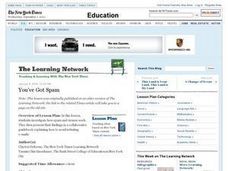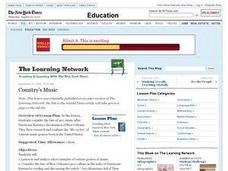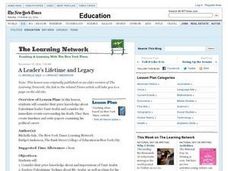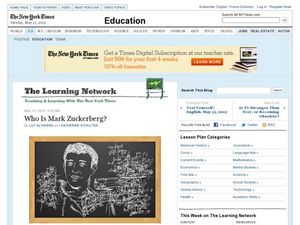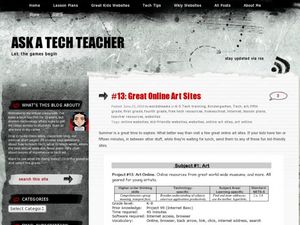Curated OER
Ambassadors of Art
Have your class create their own art exhibit. Learners study the exchange of artwork between the Louvre in Paris and two American art museums, and create an introductory exhibit featuring European and American art from the Renaissance...
Curated OER
States and Mates
Discuss and reflect on the concept of allies and alliances. The class examines the competition between the United States and Venezuela. Using the New York Times, they search for examples of geopolitical alliances. In addition, they write...
Curated OER
Dictating the Future
Read the article "Bush Lays Out Goals for Iraq: Self-Rule and Stability" and examine the keys points from President Bush's speech. Whether presented in written text or as an audio bite students will work in groups to research world...
Curated OER
P.C. Games
Discuss and share opinions on violent computer games. After reading an article, your class will discover the controversy surrounding online games. They analyze the suitability of computer games and write their own letters to a developer...
Curated OER
Decoding the First Alphabets: Not as Simple as A, B, C
Explore early writing systems and their significance in understanding the development of past civilizations. In groups, learners research early writing systems and then present their findings to the rest of the class. They teach their...
Curated OER
Mapmaker, Mapmaker, Make Me a Map
Second and third graders practice with basic map skills. They create their own map including a legend and a compass rose. This fabulous plan has many excellent websites linked which allow learners to explore maps of all kinds; including...
Curated OER
You've Got Spam
What is spam mail? Discuss examples of spam mail and read about the "Can Spam Act." After reading the New York Times article attached, brainstorm why the act hasn't had much impact yet. Several discussion questions are listed.
Curated OER
The Fabric of History
African-American history is an integral part of what America is. Learners examine important events, read informational texts, and create quilts depicting specific eras in African-American history. Each image created for the quilt will be...
Curated OER
Worried Sick
Is health insurance a luxury? The class examine the increasing number of uninsured middle class Americans; they then research and present information on various aspects of medical coverage and care at a classroom forum entitled "The...
Curated OER
Making a Case
Start the day by sharing opinions about human rights. Then, read "A Defiant Hussein Pleads Not Guilty to Mass Execution" with your middle and high school class. Your pupils research the specific charges in the case against Saddam...
Curated OER
Country's Music
Jazz, Blue Grass, Hip Hop, Swing. Gospel, R&B, Ragtime, Disco. So many music genres born in the USA. After reading an article about the fate of New Orlean's Jazz after Hurricane Katrina, class members investigate the life cycles of...
Curated OER
A Leader's Lifetime and Legacy
For this lesson, students consider their prior knowledge about Palestinian leader Yasir Arafat and consider the immediate events surrounding his death. They then create timelines and write papers examining his political career.
Curated OER
Retelling the African Folktale Abiyoyo
Act out the African folktale Abiyoyo. Kindergartners listen to the tale and discuss the characters, dressing as their favorite characters in order to retell and perform Abiyoyo using props. They will gain an understanding of...
Curated OER
Who is Mark Zuckerberg?: Reading Informational Text
This New York Times "Learning Network" exercise provides 10 questions that apply to an article about Mark Zuckerberg. It poses key journalistic questions like, who, what, why, where, how, and when. This resource provides a nice, short...
Curated OER
Financial Security
Students take an economic angle on social security, working in small groups to create a reader's guide to the program and the current debate.
Curated OER
What's the Hold-Up?
Students explore the current plan by New York City Mayor Michael Bloomberg to retain underperforming third graders in public schools. They research and debate social promotion versus retention.
Curated OER
Making Conventions Unconventional
Students discover how Internet altered the public's involvement in the 2000 Democratic and Republican conventions, and synthesize their evaluations of convention sites to design their own pages for a convention-related Web site.
Curated OER
The Aesthetics of Activism
Students explore ways in which artistic expression has been used to promote awareness of AIDS. They create their own designs to promote awareness of a social, political, or economic issue of importance to their age group and community.
Curated OER
Afghan I Stand
Students explore the history of ethnic groups, leadership, internal and external conflicts, social and economic conditions, and geographical boundaries of Afghanistan to present to fellow classmates at a teach-in.
Curated OER
Discriminating Issues
Young scholars examine how U.S. Law Defines Discrimination In this lesson. They research the issues surrounding a variety of types of discrimination, and then write editorials analyzing legal and social positions on discrimination in the...
Curated OER
Virtual Connections
Learners use prior knowledge to develop a survey on their peers' habits and preferences regarding video games and online gaming. They examine the social aspect of online gaming by discussing "Where Warriors and Ogres Lock Arms Instead of...
Curated OER
Perspectives from the Present
Students use the Learning Network's '1999 Year in Review Quiz' to revisit significant news events and examine the impact these news events had. They create their own quizzes based on news topics of their choice.
Curated OER
Monumental Mysteries
Students investigate the Internet's role in preserving ancient monuments. They create an Internet scavenger hunt, a collection of Web sites and related questions about an ancient monument and how it reflects its culture.
Curated OER
Great Online Art Sites
Students complete an online study of art websites. In this art and technology instructional activity, students explore the links and try the activities to learn about art online.








